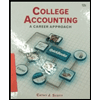
Concept explainers
1.
Ethical Case Study
V is the assistant chief accountant of Company I and is busy in preparing the
To Identify: The stakeholders in this situation.
2.
To Identify: The ethical issues involved.
3.
To Identify: The alternatives available to V.
Want to see the full answer?
Check out a sample textbook solution
Chapter 3 Solutions
FINANCIAL ACCOUNTING>IC<
- Between the end of one month and the 15th day of the next month, the balance in the employers business bank account has been getting smaller and smaller. An employee prepares the next payroll and correctly computes the necessary withholding taxes. The employer is supposed to pay accumulated employment taxes on the 15th of the next month. Payday is the last day of the month. However, the employer has used the funds withheld from employees to pay some of the businesss bills. He hopes that enough of the customers who owe him money will pay their outstanding debts. If his assumption is true, the checking account will have enough in it to pay the federal deposit on the 15th of the month. Is the employer acting ethically? After all, he says he intends to have enough money in the account for the deposit. Explain your answer.arrow_forwardYou run a consulting firm. During Year 1, your firm collected $200,000 from clients (all of these payments were for work previously done). On January 1, Year 1, the Accounts Receivable account had a balance of $40,000. On December 31, Year 1, the Accounts Receivable account had a balance of $60,000. Based on this information, what amount should your firm recognize as revenue for Year 1?arrow_forwardIt is the last day of the month and fiscal year, your manager asks you to create an invoice for $10,000 (debiting Accounts Receivable and Crediting Sales) and send it to a specified customer. Normally invoices are sent to customers when products have been shipped or the service has been finished. You manager tells you that we will be shipping equipment and performing the setup services for this customer next month (as early as next week). How would the company’s financial statements (and the users of the financial statements) be affected if you record this entry?arrow_forward
- Each year Susan Riley, president of Bargon Construction, Inc., takes a three-week vacation to Hawaii and signs several checks to pay major bills during the period in which she is absent. Riley’s vacation often occurs near the end of Bargon’s fiscal reporting period because it is a slack time for the construction business. Jack Morgan, head bookkeeper for the company, uses this practice to his advantage. He makes out a check to himself for the amount of a large vendor’s invoice and records it as a payment to the vendor for the purchase of supplies. He holds the check for several weeks to make sure the auditors will not examine the canceled check. Shortly after the first of the year, Morgan resubmits the invoice to Riley for payment approval and records the check in the cash disbursements journal. At that point, he marks the invoice as paid and files it with all other paid invoices. Morgan has been following this practice successfully for several years and feels confident that he has…arrow_forwardWeimar World, a tax-preparation service, had a cash balance of $245,000 as of March 1. During the month of March, Weimar World had the following transactions. Billed $992,000 in revenues on credit Received $328,000 from customers’ accounts receivable Incurred expenses of $388,000 but only paid $175,400 cash for these expenses Prepaid $64,400 for computer services to be used next month What was the company’s cash balance on March 31?arrow_forwardNew Wave Images is a graphics design firm that prepares its financial statements using a calendar year. Manny Kinn, the company treasurer and vice president of finance, has prepared a classified balance sheet as of December 31. In January, this balance sheet will be submitted along with an application for a loan from First Peoples Community Bank. An excerpt from the balance sheet follows: The accounts receivable balance includes a $56,000 loan to Tom Morrow, the company president. Tom borrowed the money from New Wave 18 months earlier for a down payment on a new home. Tom has orally assured Manny that he will pay off the loan within the next year. Because Tom is the company president, Manny treats the amount due as a trade account receivable. In addition, Manny knows that the bank will consider a large balance in trade accounts receivable more favorably than a large personal loan to a single individual. Manny reported the $56,000 in the same manner on the preceding year's balance…arrow_forward
- Buddy Dupree is the accounting manager for On-Time Geeks, a tech support company for individuals and small businesses. As part of his job, Buddy is responsible for preparing the company’s trial balance. His supervisor placed a “hard deadline” of Friday at 5p.m. for the completion of the trial balance. Unfortunately, Buddy was unable to get the trial balance to balance by the due date. The credit side of the trial balance exceeded the debit side by $3,000. To make the deadline, Buddy decided to add $3,000 debit to the vehicles account balance. He selected the vehicles account because it will not be significantly affected by the additional $3,000. Questions: Is Buddy behaving ethically? Why or why not? Who is affected by Buddy’s decision? How should Buddy have handled this situation?arrow_forwardGeorge Costanza is an accountant for Vandelay Industries, a footwear and apparel company. The company's revenue and net income have increased by more than 100% over the past three years. During the same period, George and his colleagues in the Accounting Department have not received a raise or salary increase. Frustrated by not receiving a raise while the company has thrived, George has begun submitting expense reimbursements for personal purchases. George has a good relationship with his supervisor, and the supervisor simply "signs off" on George's expense reimbursements. George suspects that his supervisor knows that he is submitting personal expenses for reimbursement and is "looking the other way" because George has not received a raise in the past three years. Are George and his supervisor acting in an ethical manner? Why or why not?arrow_forwardBuddy Dupree is the accounting manager for On-Time Geeks, a tech support company for individuals and small businesses. As part of his job, Buddy is responsible for preparing the company’s trial balance. His supervisor placed a “hard deadline” of Friday at 5 pm for the completion of the trial balance. Unfortunately, Buddy was unable to get the trial balanceto balance by the due date. The credit side of the trial balance exceeded the debit side by $3,000. To make the deadline, Buddy decided to add a $3,000 debit to the vehicles account balance. He selected the vehicles account because it will not be significantly affected by the additional $3,000.1. Is Buddy behaving ethically? Why or why not?2. Who is affected by Buddy’s decision?3. How should Buddy have handled this situation?arrow_forward
- Chai Me, Inc., a merchandiser of herbal tea products, began operations on January 1. The company expects sales in its first month of operations to total $18,000. 80% of the sales are expected to be cash sales. The remaining sales are expected to be on account and will carry payment terms of net 30. The company estimates that 99% of its sales on account will be collected in the month following the month of sale. The remaining 1% is deemed uncollectible. The company will recognize bad debt expense under the allowance method of accounting for bad debts in the month in which the credit sales occur. Inventory purchases during January are expected to equal $4,000. Purchases are paid for in the month of purchase. No purchase discounts are available. Chai pays its sales staff a 10% commission on all sales made. The commission expense is recognized in the month of sale and is paid on the 10th of the following month. Chai’s expected fixed monthly operating expenses are $4,570.…arrow_forwardAhrens Inc. is preparing its January 31 balance sheet. Ahrens has $3,100 in Supplies to be used in March, $4,700 Notes Receivable to be collected in August, $800 in Prepaid Insurance to be used in April, and $6,200 in Accounts Receivable to be collected in June. In what order should Ahrens list these assets?arrow_forwardIn its first month of business, Brewed Awakenings, Inc., collected $34,000 from customers in advance during May. During May, it performed $6,000 of services. What is the balance of the Deferred Revenue account at the end of the month?arrow_forward
 College Accounting (Book Only): A Career ApproachAccountingISBN:9781337280570Author:Scott, Cathy J.Publisher:South-Western College Pub
College Accounting (Book Only): A Career ApproachAccountingISBN:9781337280570Author:Scott, Cathy J.Publisher:South-Western College Pub College Accounting (Book Only): A Career ApproachAccountingISBN:9781305084087Author:Cathy J. ScottPublisher:Cengage Learning
College Accounting (Book Only): A Career ApproachAccountingISBN:9781305084087Author:Cathy J. ScottPublisher:Cengage Learning

